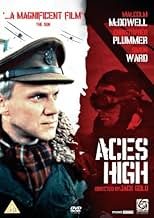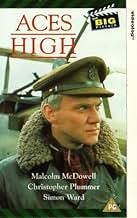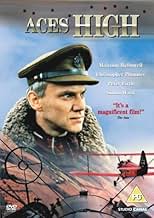NOTE IMDb
6,6/10
3,3 k
MA NOTE
Ajouter une intrigue dans votre langueIn World War I, the high casualty rate amongst the rookie pilots of the Royal Flying Corps puts an enormous strain on the survivors.In World War I, the high casualty rate amongst the rookie pilots of the Royal Flying Corps puts an enormous strain on the survivors.In World War I, the high casualty rate amongst the rookie pilots of the Royal Flying Corps puts an enormous strain on the survivors.
- Réalisation
- Scénario
- Casting principal
- Nomination aux 1 BAFTA Award
- 1 victoire et 2 nominations au total
Gilles Béhat
- Beckenauer
- (as Gilles Behat)
Avis à la une
A quiet sense of detachment hangs over the little airfield in the heart of the French countryside where this drama is played out. In the opening scenes, as the ridiculously young Lieutenant played by Peter Firth arrives, there is much talk of tea and biscuits, and everything seems very civilised. But under the serene surface there are a mass of tics and twitches, the causes of which are subdued by forced gaiety and too much alcohol.
Firth hero-worships McDowell's youthful commander – who just happens to be his sister's sweetheart – but McDowell is a tarnished hero. His psychological flaws are emphasised in the opening scenes in which we seem him toying with a German pilot whose plane has crash-landed before scything him down in a hail of bullets from his plane. McDowell needs a drink just to climb into the cockpit (while another ace, played by Simon Ward, feigns neuralgia to escape the terrors of aerial combat) and is haunted by a loneliness borne of the repetitive chore of writing letters of condolence to the families of the teenage fighter pilots who are shot down under his command.
There's nothing particularly groundbreaking in Jack Gold's WWI saga, but it is all professionally staged and acted with some crisply edited aerial sequences. All the situations are familiar, and the film must have seemed a little dated when it was released (around the same time as Star Wars), but there's a reassuring Britishness about it all. Despite the reasonably graphic depiction of the terrible psychological consequences of regularly flying towards one possible death, the film is still something of a throwback to the likes of Hollywood's The Dawn Patrol. Only here, the line between the good guys and the bad guys is blurred, and opposing pilots aren't so blinded by national duty that they can't appreciate and acknowledge the professionalism and spirit of their rivals when the opportunity arises. The ending is inevitable – the cycle continues – and elements of the story belie the age of its source material, but Aces High still delivers a quality film experience.
Firth hero-worships McDowell's youthful commander – who just happens to be his sister's sweetheart – but McDowell is a tarnished hero. His psychological flaws are emphasised in the opening scenes in which we seem him toying with a German pilot whose plane has crash-landed before scything him down in a hail of bullets from his plane. McDowell needs a drink just to climb into the cockpit (while another ace, played by Simon Ward, feigns neuralgia to escape the terrors of aerial combat) and is haunted by a loneliness borne of the repetitive chore of writing letters of condolence to the families of the teenage fighter pilots who are shot down under his command.
There's nothing particularly groundbreaking in Jack Gold's WWI saga, but it is all professionally staged and acted with some crisply edited aerial sequences. All the situations are familiar, and the film must have seemed a little dated when it was released (around the same time as Star Wars), but there's a reassuring Britishness about it all. Despite the reasonably graphic depiction of the terrible psychological consequences of regularly flying towards one possible death, the film is still something of a throwback to the likes of Hollywood's The Dawn Patrol. Only here, the line between the good guys and the bad guys is blurred, and opposing pilots aren't so blinded by national duty that they can't appreciate and acknowledge the professionalism and spirit of their rivals when the opportunity arises. The ending is inevitable – the cycle continues – and elements of the story belie the age of its source material, but Aces High still delivers a quality film experience.
I have seen this film when I was young, and was very impressed. Probably it turns on my interest in aerial warfare in World War I. Despite technically awful from the airplanes types view, the film shows exactly, with no glamour, how was the life of fighter pilots in WWI.
Life expectancy for a new pilot was just two weeks. There was no real training for the pilots, and few of the old pilots care about teaching anything to the new ones. If you look at the dangerous machines they should fly, antiaircraft fire and the enemy machines, it's a miracle that someone has survived to told us the history.
Life expectancy for a new pilot was just two weeks. There was no real training for the pilots, and few of the old pilots care about teaching anything to the new ones. If you look at the dangerous machines they should fly, antiaircraft fire and the enemy machines, it's a miracle that someone has survived to told us the history.
Written from the English point of view, this film seems to have it's tongue in it's cheek at times, but it's not at all funny. There are several flashes of humor in the early scenes, at the expense of the British upper class, but those quickly give way to the special horrors of the first war fought in the air.
Patriotic young pilots straight out of college lost their lives in literally a few days time, due to their inexperience and the stress of this new kind of battle. Malcolm McDowell has the unwelcome task of leading the 76th Squadron and also visiting colleges to drum up recruits, all the while knowing he's inviting them to an almost certain death. He keeps these new recruits at arms length to soften the blow to his mental health when they invariably get shot down. When he shows up at his own alma mater, an idealistic young man, played by Peter Firth, signs up for McDowell's squadron. On his arrival at the airfield, Firth sees the evidence of the turnover in pilots but fails to see the connection to his own longevity; a family photo and personal effects are whisked out of the room he's been assigned, right in front of his eyes. He is introduced to Simon Ward, a stony-faced pilot who by the end of the movie is finally driven insane by the awful, daily anticipation of his own death in battle.
The young pilots experience the respect that their station in the Air Corps elicits from the locals and from women, but at the same time they see how they are more likely to be killed than the average filthy foot soldier. Firth is taken with a local cabaret girl, who invites him to her room one night. The next night, when he expects her to be glad to see him, she ignores him and pays attention to an older, richer officer. The very next day the pilots are given the task of destroying German spotter balloons, which always have heavy gun and air protection, and the older pilots know this is almost a death warrant. Six planes go out, with McDowell and Firth in two of them, but you'll have to watch the film to find out how many come back.
A very good, but depressing, film, McDowell is subdued in his performance and seems to come out of his cocoon only at the end. This is necessary, I think, for his character to survive in the surroundings of constant tragedy. Firth is naive in the extreme, and this probably a correct portrayal of a green recruit in WWI, where there was no frame of reference for how dangerous those early airplanes were. The film shows us just how little the commanders valued the lives of their men by sending them out unprepared and inexperienced, and that they know after one group of fliers is decimated, there is always a fresh batch of innocent boys to take their place. I recommend the film highly, since it has a firm anti-war message.
Patriotic young pilots straight out of college lost their lives in literally a few days time, due to their inexperience and the stress of this new kind of battle. Malcolm McDowell has the unwelcome task of leading the 76th Squadron and also visiting colleges to drum up recruits, all the while knowing he's inviting them to an almost certain death. He keeps these new recruits at arms length to soften the blow to his mental health when they invariably get shot down. When he shows up at his own alma mater, an idealistic young man, played by Peter Firth, signs up for McDowell's squadron. On his arrival at the airfield, Firth sees the evidence of the turnover in pilots but fails to see the connection to his own longevity; a family photo and personal effects are whisked out of the room he's been assigned, right in front of his eyes. He is introduced to Simon Ward, a stony-faced pilot who by the end of the movie is finally driven insane by the awful, daily anticipation of his own death in battle.
The young pilots experience the respect that their station in the Air Corps elicits from the locals and from women, but at the same time they see how they are more likely to be killed than the average filthy foot soldier. Firth is taken with a local cabaret girl, who invites him to her room one night. The next night, when he expects her to be glad to see him, she ignores him and pays attention to an older, richer officer. The very next day the pilots are given the task of destroying German spotter balloons, which always have heavy gun and air protection, and the older pilots know this is almost a death warrant. Six planes go out, with McDowell and Firth in two of them, but you'll have to watch the film to find out how many come back.
A very good, but depressing, film, McDowell is subdued in his performance and seems to come out of his cocoon only at the end. This is necessary, I think, for his character to survive in the surroundings of constant tragedy. Firth is naive in the extreme, and this probably a correct portrayal of a green recruit in WWI, where there was no frame of reference for how dangerous those early airplanes were. The film shows us just how little the commanders valued the lives of their men by sending them out unprepared and inexperienced, and that they know after one group of fliers is decimated, there is always a fresh batch of innocent boys to take their place. I recommend the film highly, since it has a firm anti-war message.
This is an excellent film about WWI Royal Flying Corps and their fights against the Germans over the trenches.
Fantastic cast - McDowell, Trevor Howard, Peter Firth, Simon Ward and Christopher Plummer - they are all some of the best in the business at portraying English upper classes. Especially the mean McDowell (with his ironic speech at Eton 'we are caning them' when they're not really) and the callow Peter Firth, all Boys Own enthusiasm.
Shows the pious nature of the English elite, with John Gielgud as the headmaster spouting out empty platitudes about decency and 'playing the game' while, meanwhile, McDowell is playing dirty tricks on German pilots (the scene where he gets his opponent to land in the field and then destroys him as he walks towards his plane to offer help).
Fantastic aerial shots.
Fantastic cast - McDowell, Trevor Howard, Peter Firth, Simon Ward and Christopher Plummer - they are all some of the best in the business at portraying English upper classes. Especially the mean McDowell (with his ironic speech at Eton 'we are caning them' when they're not really) and the callow Peter Firth, all Boys Own enthusiasm.
Shows the pious nature of the English elite, with John Gielgud as the headmaster spouting out empty platitudes about decency and 'playing the game' while, meanwhile, McDowell is playing dirty tricks on German pilots (the scene where he gets his opponent to land in the field and then destroys him as he walks towards his plane to offer help).
Fantastic aerial shots.
Ive seen this film about four times. A great film that didn't flinch from showing a class-ridden and brutal look at the reality of World War 1. Malcolm MacDowell was excellent as the Squadron Leader and Christopher Plummer was superb as the 'kindly uncle' figure who gave allowances and understanding to young pilots who were faced with the prospect of death every day on active duty.
World War One films are very hard to make , simply because the Director has to capture and expose the horror of a modern war in a period where the participants are caught in a mood of adventure and duty.Aces High demonstrates this fact entirely.
The film is based on the book Journeys End , and damn I missed it when it was on at the theatre , but hey. Anyway this film version is turned into the Play with Planes.
Anyway a great Film and brilliantly acted. I highly recommend this film to any war film buff , like myself.
World War One films are very hard to make , simply because the Director has to capture and expose the horror of a modern war in a period where the participants are caught in a mood of adventure and duty.Aces High demonstrates this fact entirely.
The film is based on the book Journeys End , and damn I missed it when it was on at the theatre , but hey. Anyway this film version is turned into the Play with Planes.
Anyway a great Film and brilliantly acted. I highly recommend this film to any war film buff , like myself.
Le saviez-vous
- AnecdotesThis movie is an adaptation of the play "Journey's End" by R.C. Sherriff, written just after World War I. The setting is transplanted from the trenches to an airfield, but most of the characters and some incidents are almost unchanged.
- GaffesIn the first air combat scene, the German aircraft shown is a Fokker E.III monoplane. That particular model had already been withdrawn from service over a year before the movie takes place. (E.III was withdrawn early 1916, the movie takes place late 1917).
- Citations
Mess Corporal Bennett: [as the pilots set off early in the morning on a dangerous mission] How many for breakfast? Any of them?
- Crédits fousOpening credits prologue: England October 1916
- Versions alternativesSome DVD releases feature a shorter print which reduces the French restaurant scene and misses out shots of the officers looking at a slideshow of nude photographs. These appear to have been made by the distributor, as the film has never been cut by the BBFC.
- ConnexionsEdited into La vipère noire IV: Private Plane (1989)
- Bandes originalesUnder the Bridges of Paris
(Sous les Ponts de Paris)
(uncredited)
Music by Vincent Scotto
French lyrics by Jean Rodor
English lyrics by Dorcas Cochran
Meilleurs choix
Connectez-vous pour évaluer et suivre la liste de favoris afin de recevoir des recommandations personnalisées
- How long is Aces High?Alimenté par Alexa
Détails
- Date de sortie
- Pays d’origine
- Langues
- Aussi connu sous le nom de
- La bataille du ciel
- Lieux de tournage
- Sociétés de production
- Voir plus de crédits d'entreprise sur IMDbPro
Box-office
- Budget
- 1 250 000 £GB (estimé)
Contribuer à cette page
Suggérer une modification ou ajouter du contenu manquant

Lacune principale
By what name was Le tigre du ciel (1976) officially released in India in English?
Répondre

































